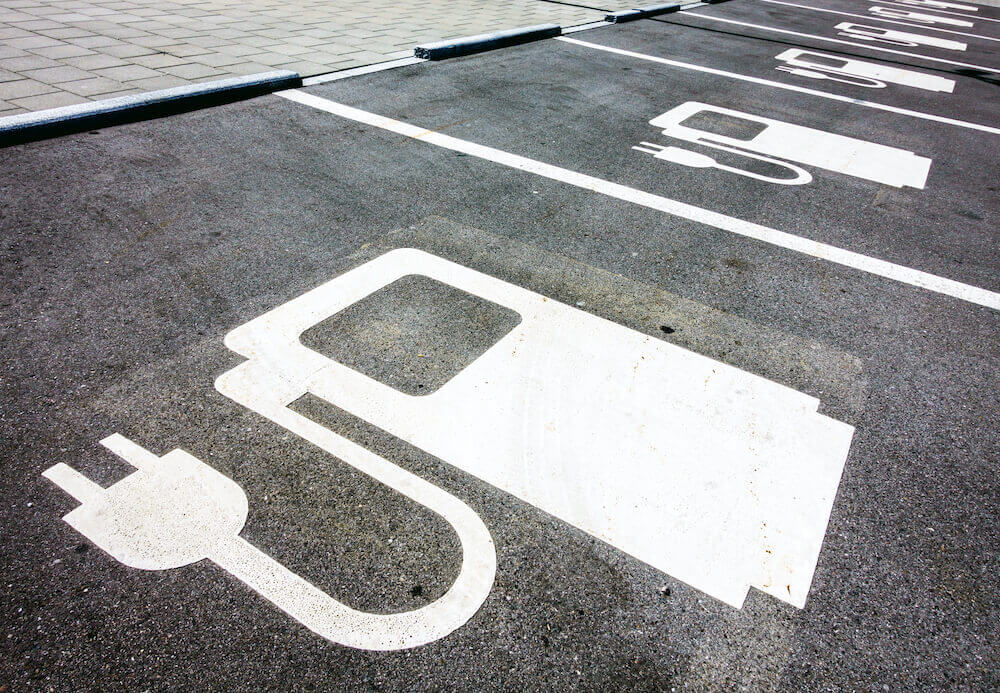While electric vehicles (EV) have been around for decades, both public and private charging systems can lead to confusion regarding what types of EV chargers exist, what they mean and what the best choice is for specific usages.
EV Charger Types
Levels
One of the first terms one comes across when researching EV charger types is “Level.” Currently, Levels 1-3 exist.
The “Level” refers to how quickly the charger is able to charge the vehicle from slowest (Level 1) to fastest (Level 3). However, there are additional differences as well:
Level 1
A Level 1 charger is the most common EV charger type. Typically, it’s just a cable that comes with the vehicle at purchase and can plug into a standard 120 Volt, 20 Amp circuit wall outlet. A Level 1 charger usually will deliver 1.4 kW of charge, providing 4 miles of driving range per hour of charging. That means it can take 11-20 hours to fully charge a vehicle. While this works for those who only drive enough to have to charge overnight at home, it can take a long time for more frequent drivers or those who are concerned about being fully charged and the driving range needed throughout the day.
Level 2
Level 2 chargers—like those available from EvoCharge—deliver 6.2 to 7.6 kW of charge vs. 1.4kW for Level 1 chargers. That means a Level 2 charger provides an average of 32 miles of driving range per hour of charge so that it only takes around 3-8 hours to fully charge an EV compared to the 11-20 hours needed for Level 1.
A Level 2 EV charger type can be hardwired by an electrician or plugged into a 240v outlet. If you don’t have a 240v outlet readily available, one can be installed by an electrician.
Another major difference between Level 1 and Level 2 chargers is that Level 2 manufacturers are frequently adding abilities to their units. At EvoCharge, you have the option of non-networked, plug-and-go chargers or OCPP units that are able to connect to a third-party network and your local utility, your local Wi-Fi for ease of use and control, and provide local load management.
Level 3
Level 3 chargers (also referred to as DC Fast Chargers) are the fastest EV charger type on the market. While it would be great for every EV charger type to be a Level 3 capable of charging a battery to full within an hour, the faster the charger, the more electricity it uses. Level 3 chargers aren’t able to be supported by homes or a majority of properties as they take far too much electricity for the localized circuit. Instead, Level 3 chargers are becoming more widely available along highways as part of the local infrastructure, similar to gas stations. Look at it this way: You can have a container of gasoline at home or work, but you can’t have your own private gas pump installed. Level 1 and 2 chargers are available for localized use, but Level 3 aren’t available for private buyers.
Connectivity
Connectivity refers to the ways in which an EV charger connects to a third party for charging or customized use. Level 1 chargers, being a standard plug that just delivers power from the outlet to the vehicle, doesn’t have connectivity abilities, but Level 2 EV charger types are available with a variety of manufacturer-provided connectivity options.
It’s important to see what connectivity options are available for any Level 2 charger you’re researching prior to purchase as units differ.
Non-Networked
A standard Level 2 EV charger type is “plug-and-go.” Like a Level 1 charger, they provide a direct line of charge from the outlet to the vehicle without additional controls.
Wi-Fi
Wi-Fi connectivity means you can connect the Level 2 EV charger to the internet via your localized Wi-Fi router. This allows you to have broader control of your charger and how it’s used.
4G
Similar to Wi-Fi, 4G Level 2 EV chargers allow you to connect to the internet without a local Wi-Fi connection. These are suitable for business use and additional rates may apply.
OCPP
OCPP—Open Charge Point Protocol—is a global initiative created by the Open Charge Alliance. A true OCPP unit is capable of being connected to a variety of different network providers. OCPP provides you with the ability to select a network provider of your choice and not be locked into a proprietary network.
Just like your smartphone and Wi-Fi router need a network to work, some EV charger types require a network provider. Most people find they prefer OCPP because they’re able to choose what network they want to use or control their charger through their local utility for extra financial incentives. If no network provider is selected, EvoCharge charging stations will still work as a non-networked unit.
At EvoCharge, we want to make choosing an EV charger type as easy as possible. If you’re trying to determine the right EV charger type for your needs, check out our Vehicle Charging Specs comparison tool.



